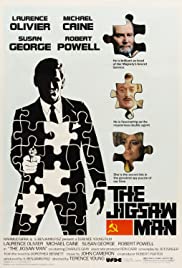
THE JIGSAW MAN
UK, 1983, 94 minutes, Colour.
Michael Caine, Laurence Olivier, Susan George, Robert Powell, Charles Gray, Michael Medwin.
Directed by Terence Young.
The Jigsaw Man is yet another British thriller focusing on relationships with Russia and the exposure of such spies as Philby, Burgess and Mac Lean and Sir Anthony Blunt. It reflects discussions about the role of the head of MI5, Sir Roger Hollis, and whether he was a Soviet agent. This film's screenplay shows some plausibility for this hypothesis.
The production of the film was beset with difficulties - and was in abeyance for some time. While the opening of the film flows smoothly, it rather hurries towards an ending, detracting from its plausibility and overall impact.
Michael Caine is effective in the central role. Laurence Olivier enjoys himself thoroughly as the crusty head of M15. Robert Powell has the hero role, Charles Gray an Anthony Blunt-type role emphasising communism, disloyalty, homosexuality in high places. Susan George does quite well in the heroine's role.
English and Finnish locations were used, the film being directed by Terence Young (Triple Cross, many Charles Bronson vehicles of the '70s).
Films focusing on Russian espionage in the '80s include John Schlesinger's An Englishman Abroad and the version of Julian Mitchell's play Another Country.
1. An entertaining espionage story? Good action adventure? Basis in contemporary history? A human drama?
2. Production values: the use of English locations, London, Woburn Abbey, the English countryside? The use of Helsinki for Moscow locations? The musical score, songs - the final song by Dionne Warwick? Did the film measure up to its technical assets?
3. The title and its meaning, from the point of view of the Russians, from the point of view of the English? The enigma of Sir Philip Kimberley? The English spies who were upper class Englishmen yet Soviet agents as jigsaw men? Indicating interest and themes?
4. The background of history and the hypothesis that the head of M15 would be a Soviet agent? Sir Philip Kimberley and his role in Britain, the Admiral's admiration for his ability - as a chess player agent and manipulator? His defection to Moscow? The flashback to his wife - and her suicide? The effect on his daughter and her being in hiding, his not writing to her? His dissatisfaction with life in Moscow? Comparisons with Philby and the others? The proposal by the Russians to fabricate his death and return him to England? The skills in plastic surgery and the transformation of his face, the athletics programme and his being 20 years younger? The failure to take into account fingerprints? His agreement to return to England and recover the Soviet payroll list? The guards, his return to England, his passport and his attempt to defect? His contacting Milroy yet his escape? The contact with the Admiral? His strength and attacks on policemen? The bargain with the Admiral? His being shot, going to his daughter, enlisting her help, being safe in the country? The microfilm in the church in the statue of the angel? The attack on the hotel keeper and his escape? The appointment at Woburn Abbey, his feeling that he was betrayed? His being shot, hospitalisation? The reconciliation with his daughter? An anonymous future? The deal with the Admiral?
5. Laurence Olivier's style as the Admiral - crusty, blunt, aristocratic? head of MI5? The interview with Milroy? Admiration for Philip Kimberley? The encounter with Kuzminsky? The pursuit, the taking of Penny and setting her up for the contact with her father? Friendship with Fraser and reliance on him, suspicions of Schorey? The Woburn Abbey confrontation? The final getting of the list and his deal with Kimberley?
6. Penny and her relationship with Fraser, her past, her settling down, the encounter with her father, eventually believing him, the lyrical scene in the countryside, helping him to the hotel, her friend, being taken in her place, going to the apartment, being taken by MI5, the set-up in the church, her disgust with Fraser, reconciliation? Susan George's brief scene as her mother in the flashback with the Admiral?
7. Fraser and his cover, work for MI5, United Nations work? Possibility of succeeding the Admiral? Involvement with Penny? The set-up with Schorey and his being misunderstood because of the death of the homosexual spy in America? His being in on the action, reconciliation with Penny?
8. Schorey and his aristocratic ways, the encounters with the Admiral, discussions? The homosexual overtones? His misjudging Fraser? His wanting Kimberley killed? His confession, death? The aristocratic touch with the story of his wig-land its being settled properly?
9. The background of the Russians and their plans? Devious ways on international espionage? The response of the British?
10. The authentic atmosphere - the scenes in the hotel, Susan and Ginger and the danger for then, the vicar and the church, Woburn Abbey, the police, the Admiral's housekeeper,- a gallery of credible characters?
11. Perennial interest in the themes of loyalty, betrayal, double deals? Espionage as a deadly game?